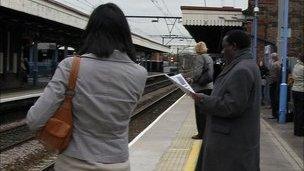East Coast trains 'less punctual'
- Published

Passengers were less likely to be kept waiting this January, than in the same month the year before
Government-run train operator East Coast had 8.8% fewer trains on time in January this year than January 2010, despite milder weather, figures show.
Network Rail also revealed 11 of Britain's 19 train companies ran fewer punctual services last month compared with last year's snow-hit January.
However, overall 90.3% of trains ran on time - an improvement on the January 2010 figure of 89.5%.
Most East Coast delays were caused by "external factors", a spokesman said.
The government took over the running of the East Coast mainline - one of Britain's busiest train routes - in November 2009 after its operator, National Express, defaulted on its franchise.
Run on behalf of the Department for Transport before a return to the private sector, it was the worst-performing company in this period, operating 80.9% of trains on time.
The best-performing company was the Transport for London-managed London Overground which achieved a trains-on-time figure of 96.4%.
The company improving most was Virgin Trains with a punctuality figure on its West Coast services of 86.9% - a 9% rise on its January 2010 performance.
NR operations and customer services director Robin Gisby said: "It is good to see train performance bounce back and start to recover to the high levels passengers, and our customers, have come to expect.
"While this is good news, our focus remains on bringing all train operators up to the level of the very best performers and we are re-focusing our efforts, in partnership with the train operators, to improve the level of service experienced on the East Coast Main Line."
10 minutes
An East Coast spokesman said: "Around four-fifths of our delays continue to be caused by external factors, such as cable theft, trespassers on the railway, weather-related problems and issues relating to the infrastructure."
But passenger group Passenger Focus was critical of the delays on East Coast over the past month, and of the definition of "on time".
A train is on time if it reaches its end destination within 10 minutes of its specified time, even if it has been arriving at stations "half-an-hour later" en route.
Ashwin Kumar, passenger Focus rail director said: "Our research shows that passengers' satisfaction with punctuality has been dropping.
"Delivering trains on time is key to keeping passengers happy.
"With as many as one in five trains at least 10 minutes late at their destination, many passengers will know only too well the frustration of not being able to rely on the East Coast timetable."
"But these figures only show part of the story. No information is available about trains running behind schedule along the route and most passengers don't think of 10 minutes late as 'on time'.
"Passenger Focus research shows that satisfaction on longer-distance journeys starts to drop after only four to six minutes of delay, not 10 minutes."
- Published3 February 2011
- Published5 January 2011
- Published13 December 2010